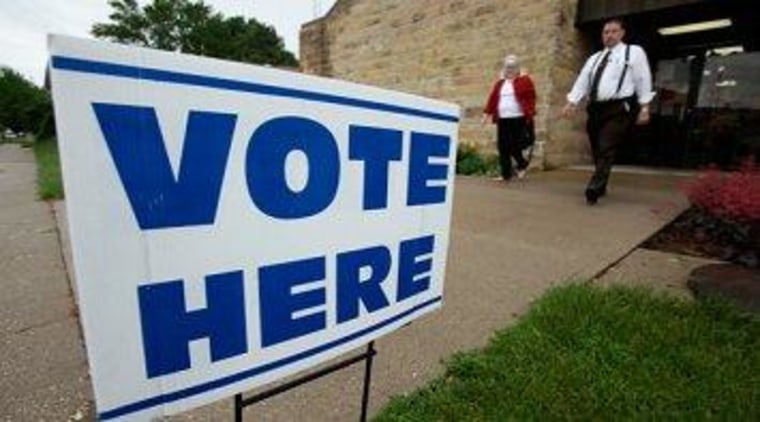When it comes to the political system and democratic process, one of the most important stories of the year is the wave of voter-suppression tactics imposed by Republican policymakers across the country. The most pernicious and hard-to-defend trend is the spate of voter-ID laws, creating a new and unnecessary burden on voters.
The New York Times ran a story on this last week, noting what "both sides" have argued. Republicans, of course, said the laws are necessary to combat fraud, while Democrats insisted this thinly-veiled disenfranchisement scheme is an unsubtle ploy to rig the elections in the GOP's favor by disproportionately affecting traditional Democratic constituencies.
The Times' piece did not, however, get around to mentioning the only critical detail surrounding the entire controversy: the fact that documented instances of in-person voter fraud are extraordinarily rare. You are, quite literally, far more likely to get struck by lightning than find a legitimate example of fraud that would have been prevented by voter-ID.
So, why in the world did the paper of record publish a fairly long article on the subject without telling readers the most important fact of the larger debate? Margaret Sullivan, the Times' public editor, asked those involved with the piece.
"There's a lot of reasonable disagreement on both sides," [Times national editor, Sam Sifton] said. One side says there's not significant voter fraud; the other side says there's not significant voter suppression. "It's not our job to litigate it in the paper," Mr. Sifton said. "We need to state what each side says."[Ethan Bronner, who wrote the article] agreed. "Both sides have become very angry and very suspicious about the other," he said. "The purpose of this story was to step back and look at both sides, to lay it out." While he agreed that there was "no known evidence of in-person voter fraud," and that could have been included in this story, "I don't think that's the core issue here."
That sound you hear is me banging my head against my desk.
Look, he-said/she-said reporting is routine, and I realize good reporters are often cautious about taking sides. But there's an objective truth in a story like this, and there's nothing wrong with media professionals providing that truth to the public. Reality does not actually have a liberal bias, and there's no reason for the Times to pass along competing arguments while encouraging its readers to go elsewhere to discover which argument is accurate.
Kevin Drum had a good sharp piece on this over the weekend.
I don't have a problem with giving both sides some air time, but by far the main focus of the voter access battle is stringent photo ID laws -- and the only real justification for stringent photo ID laws is that it stops in-person voter fraud. (That is, the kind of fraud where people show up in person at a polling place and pretend to be someone they aren't. Even in theory, photo ID laws can't stop any other kind of fraud.) This means that the existence of in-person voter fraud is exactly the core issue. If you don't address the truth of that claim, you simply haven't done a good job of informing your readership.And apparently Bonner knows this. He agrees that there's no known evidence of in-person voter fraud. So why on earth would he not make that clear in a story about voter ID laws? This wouldn't require him to take a stand on the laws themselves, only to point out to readers in his own voice that in-person voter fraud basically doesn't exist. They can then draw their own conclusions about whether voter ID laws are a good idea anyway and what the motivation for them is.
When critical details about pressing policy matters are deliberately omitted from news articles, all because of a fear of criticism from the right, then reporting on voting rights has gone badly off the rails. It's really not complicated.
(1) Republicans claim to fear voter fraud.
(2) To address the threat of fraud, they're creating new voting restrictions -- which could disenfranchise millions of eligible American voters -- which just do happen to affect Democrats.
(3) There's no actual fraud, and the policy is, an objective matter, a solution to a problem that doesn't exist.
By what reasoning are points (1) and (2) relevant, but (3) is not?
